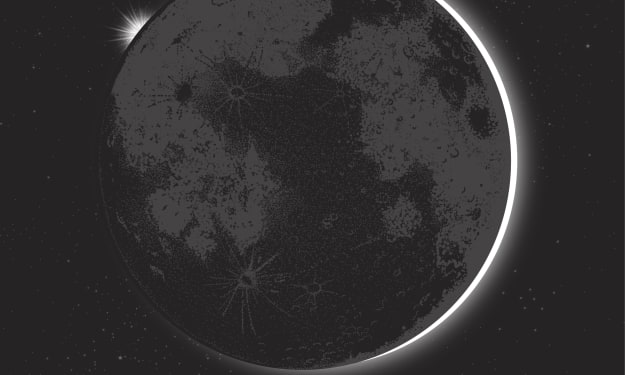interview
Interview with key figures in the world of science and science fiction.
The Sandman's True Colors
I haven’t slept properly in over a week. I know I don’t need sleep because I am one of the undead. I am neither a zombie nor a vampire. I am a specter. Most of the living and undead creatures I have met don’t understand why a specter like me would want to sleep.


Interview With Cidney Hue - Director of 'OVUM' A Provocative Sci-Fi Short About Reproductive Rights
Accomplished, New York-based filmmaker Cidney Hue “breaks” sci-fi by creating films that merge hard science with speculative scenarios in order to speak to contemporary life - including centering women's voices.
Rod FaulknerPublished 4 years ago in Futurism

Matt Ward: Futurist • Podcaster • Author
Matt Ward is man of many talents: an author, entrepreneur, startup advisor and business coach, and a futurist who hosts the Disruptors.FM tech podcast. Ward has a diverse background: a passion for science and technology, coupled with a love of adventure, backpacking through Southeast Asia, South America, and beyond.
K.E. LanningPublished 4 years ago in Futurism- Top Story - May 2018


The Star Wars: The Tale Before the Force
Greetings, young ones. May the fourth be with you. And if for some reason this article comes out the next day, then long live the fifth. Either way, for Jedi and Sith alike, today is basically one of the largest pop culture holidays of all time. I can't think of any others so widely celebrated. As padawans and their masters celebrate more than 40 years of the force, it’s important to look back where it all started.
DJ JohnsonPublished 6 years ago in Futurism - Top Story - February 2018


Daniel Abella Explores the Cerebral "What If" of Science Fiction
The legendary Philip K. Dick authored 44 published books and over 150 short stories. Over the generations, sci-fi minds have repurposed Dick's stage of the strange and otherworldly when writing, filming, or creating the future of technological advancement - inescapable dystopian realities. PKD's long, outstanding, and unrivaled legacy has created a ripple effect of his own timeless infamy, portrayed in all of the work he has inspired.


John Crowley: Great Novelist and Master of Fantastika
John Crowley is an American author of fantasy, science fiction and mainstream fiction. He is best known as the author of Little, Big (1981), which received the World Fantasy Award for Best Novel and has been called "a neglected masterpiece" by Harold Bloom, and his Ægypt series of novels which revolve around the same themes of Hermeticism, memory, families and religion.
Felicity HarleyPublished 6 years ago in Futurism

Rachael Rumancek Exclusive with 'Twilight' Heartthrob Kellan Lutz on His Latest Role in 'the Osiris Child'
He stole our hearts in the Twilight franchise, then again took our breath away in Samuel Bayer's reimagining of A Nightmare on Elm Street only to find ourselves picking our jaws up off of the floor after watching him kick some major ass in the The Legend of Hercules. His versatility and talent is as undeniable as his charismatic good looks but there is still more than meets the eye with actor Kellan Lutz – and it's a whole lot nerdier than you may have imagined.
Rachael RumancekPublished 6 years ago in Futurism

Andy Weir Comes Clean on How and Why He Writes
I’ve just finished reading Andy Weir’s new book, Artemis. This time, Weir’s characters inhabit a colony on the moon in the late twenty-first century. Because there’s been so much talk recently about the colonization of Mars, I was interested to learn what Weir had to say on the moon becoming a colony versus Mars.
Felicity HarleyPublished 6 years ago in Futurism

In the Author's Universe: Interview with Sci-Fi Author Andy Weir
Andy Weir rose to fame with the publishing and subsequent film production of his debut novel, The Martian, published in 2011, but, as his dedicated fan base knows, his writing career began much earlier.
K.E. LanningPublished 6 years ago in Futurism

Above and Beyond Bentwaters
For some, the name Peter Robbins conjures pages from the British-Best Selling book, Left at East Gate: A First-Hand Account of the Rendlesham Forest UFO Incident, Its Cover-up, and Investigation. The controversial book covers the 1980 incident in which there were reported sightings of unexplained lights near Rendlesham Forest, Suffolk, England. There have also been claims of UFO landings and the control of nuclear weapons on the nearby Bentwaters Base by said UFOs. The Rendlesham Forest case has become wrapped in controversy, recently centering around one of the key witnesses.
Ryan SpraguePublished 7 years ago in Futurism- Top Story - October 2017


Interview with Orson Scott Card, Co-Creator of Extinct
Orson Scott Card was the first ever author to win back-to-back Hugo and Nebula Awards with Ender's Game and Speaker of the Dead. With an impressive collection of books, plays, and short stories in his repertoire, in recent years Scott Card has expanded his Ender universe to the big screen with the 2013 film adaption of Ender's Game starring Harrison Ford, Asa Butterfield, and Ben Kingsley, and now with BYUtv's new sci-fi series, Extinct.
Natasha SydorPublished 7 years ago in Futurism 

Interview with Aaron Johnston, Co-Creator of Extinct
Four hundred years after the extinction of the human race, a small group of humans is revived on the earth by an alien civilization. The aliens claim they want to restore the humanity, but the "reborn" humans uncover new dangers, hidden agendas, and powerful secrets that challenge and threaten to annihilate the species once again.
Natasha SydorPublished 7 years ago in Futurism





















